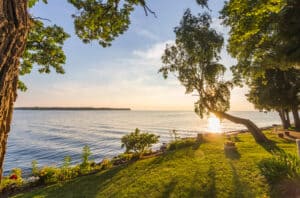Did you know that real estate is among the leading industries in Massachusetts? It’s right next to manufacturing, education, and tourism. The latter has been booming for years, owing to many exciting attractions – including massive lakes and incredible mountains – sitting on the state’s 5,034,880 acres. Speaking of which, who owns all this land?
This article reviews the top four largest landowners in Massachusetts. Keep reading to discover more about their properties, including what you’ll find on them. If you’re a foreigner contemplating buying a parcel in this state, we’ll also provide valuable information you should know before making that life-changing decision.
Private Agricultural Owners – 2,306,458 Acres
As of 2020, privately-held agricultural land in Massachusetts was a whopping 2,306,458 acres. This state has over 7,000 farms that produce crops worth $475 million annually and employ thousands of people.
These are some of the most lucrative types:
- Greenhouse, nursery, and floriculture
- Vegetables and melons
- Dairy cattle and milk production
- Fruit, tree nuts, and berries
- Animal aquaculture
- Equine production
Most Beautiful Farms in Massachusetts
If you want to explore some of Massachusetts’ agricultural land, consider the following scenic farms.:
Langwater Farm
Nestled in North Easton, the Langwater Farm is a family-run business that embraces guests and customers all year round. The fields are beautiful, with a vast range of plants, including flowers. Kevin and Kate O’Dwyer, the owners, leverage organic farming practices to produce vegetables, herbs, fruits, pumpkins, and berries.
Makepeace Farms
The A.D. Makepeace Company owns Makepeace Farms in Wareham. Besides being the world’s largest cranberry farmer, it’s also eastern Massachusetts’ biggest property owner. Bay Staters and travelers come here for many things, including farm-grown cranberry products and organic coffee imported from Uganda.
If you’re into cranberry farming, you can also learn much about growing and harvesting the fruits. Besides, the farm has a restaurant where you can dine and interact with the farmers.
Davis Farm
Owned and run by the Davises, the Davis Farm is a seventh-generation property that utilizes innovative practices to rear animals, including turtles, camels, goats, cows, ponies, and reptiles. You can cuddle and play with the creatures for as long as you like. Additionally, the staff will educate you about caring for the creatures and even allow you to purchase some to care for as pets.
Clarkdale Fruit Farms
Owned by Ben Clark, Clarkdale Fruit Farms in Deerfield is known for its award-winning produce. The latter includes more than 100 varieties of fresh fruits like apples, peaches, pears, and grapes. Even better, you can enjoy them in many forms, such as pies, candy, and pastries.
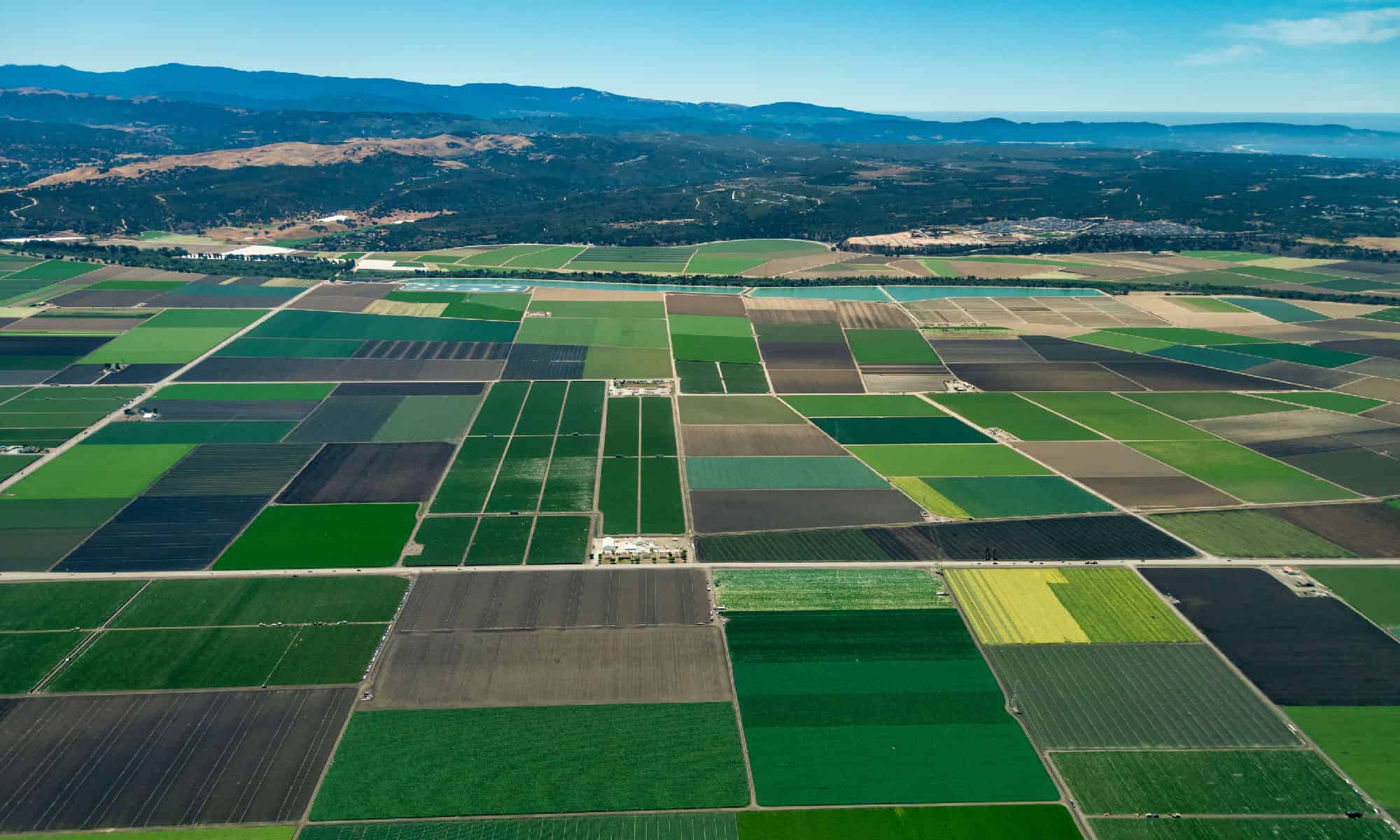
This picturesque farm land in Massachusetts is home to thousands of acres of diverse agricultural production.
©Dreamframer/Shutterstock.com
Federal Government – 62,680 Acres
The federal government owns about 28% or 615.3 million acres of the 2.27 billion acres in the US. In states like Idaho, Utah, Nevada, and Alaska, it manages more than 60% of the total land. But in Massachusetts, the system only controls 62,680 of the 5,034,880 acres available, making it the 8th state with the least federal government-owned land in the nation.
The federal government acquired land in Massachusetts by purchasing it from its owners. In some instances, it also exchanged the resource with other valuable assets like lumber and accepted donations from benevolent property owners. The system now utilizes its acres to enhance the lives of Massachusettsans, providing recreational facilities such as parks. In addition, it develops other natural resources and conserves wildlife.
The U.S. Forest Service and the U.S. Bureau of Land Management own 193 and 247.3 million acres nationwide, respectively. However, they don’t manage any land in Massachusetts; only these agencies do:
U.S. National Park Service – 32,946 Acres
The National Park Service (NPS) helps manage Massachusetts’ historic landmarks, parks, and other scenic locations. As of this writing, it administers national parks, national historic sites, national recreation, and wilderness areas in the state.
An NPS study recently discovered national parks in Massachusetts welcomed 6,694,799 visitors in 2021, bringing in an impressive $721 million. Even more interesting, that caused an economic benefit of $1.143 billion, providing employment opportunities for up to 8,897 people.
Minute Man National Historical Park
This is one of the parks the NPS manages in Massachusetts. Its name honors the famous Minutemen who volunteered to fight for the state. If you long to learn more about the American Revolutionary War’s opening battle in 1775, it’s a great place to start. Aside from preserving historic structures from the time, it provides extensive reading material covering the significant event.
The Minute Man National Historical Park has more than 100 mammals, insects, birds, fish, and reptile species. Some of the animals in the park include beavers, red foxes, coyotes, gray squirrels, fishers, bobcats, and deer mice. You can also expect to see these varieties of plants: eastern hemlock, multiflora rose, European lily of the valley, porcelain berry, American trumpet vine, oriental bittersweet, Canada mayflower, common yarrow, and Eastern white pine.
More NPS-Managed Parks
Besides the Minute Man National Historical Park, the NPS oversees the following parks fully or partially within Massachusetts’ 5M+ acres.
- Adams National Historical Park
- Boston African American National Historic Site
- Cape Cod National Seashore
- New Bedford Whaling National Historical Park
- Salem Maritime National Historic Site
- Boston National Historical Park
- Springfield Armory National Historic Site
- Lowell National Historical Park
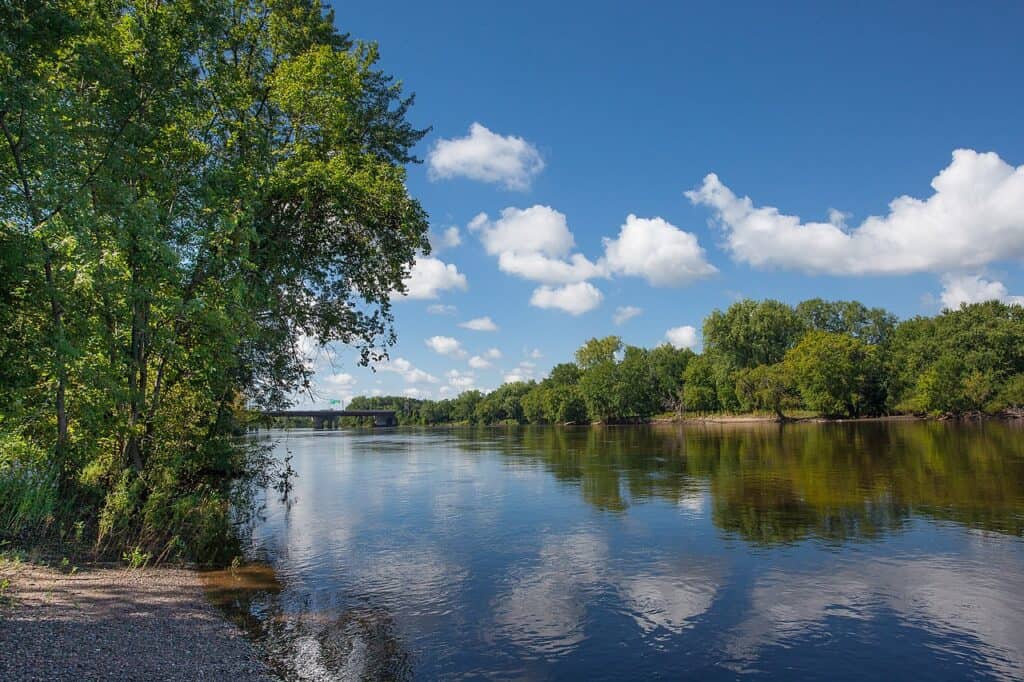
Take in the beauty of nature at Mississippi’s parks. From majestic forests and rivers to rolling hills and lush meadows, there are endless opportunities for outdoor exploration.
©NPS/Gordon Dietzman / Public Domain – License
U.S. Fish and Wildlife Service – 21,850 Acres
The FWS oversees 26.75% of the federal land in Massachusetts. This government body helps locals and tourists access nature safely and as often as they’d like. On top of that, it bands together with different organizations to combat climate change, which adversely affects animal and plant life.
Speaking of which, the FWS also endeavors to conserve native plants, wildlife, and their habitats. One of the areas under its management is the Silvio O. Conte National Fish and Wildlife Refuge in Northampton. It runs the following units:
- Westfield River Division in Becket
- Third Island Unit in Deerfield
- Hatfield Unit in Hatfield
- Fannie Stebbins Unit in Longmeadow
- Dead Branch Division in Chesterfield
- Wissatinnewag Unit in Greenfield
- Mt. Toby Unit in Sunderland
- Fort River Division in Hadley
- Mill River Division in Northampton
- Honey Pot Unit in Westfield
- Mt. Tom Unit near Easthampton
Silvio O. Conte National Fish and Wildlife Refuge Units
Each of this refuge’s divisions is uniquely designed to preserve various species. For instance, the 4-acre Third Island Unit has shallow water habitats for the bald eagle, Atlantic sturgeon, blueback herring, and American shad. On the other hand, the Fort River Division boasts forests and woodlands where coyotes, bobcats, and white-tailed deer thrive.
Because most of the Silvio O. Conte National Fish and Wildlife Refuge units are open to the public, they are convenient locations for hunting, hiking, fishing, wildlife watching, nature photography, and environmental education.
U.S. Department of Defense – 26,896 Acres
The DoD administers 32.92% of the federal government’s 81,692 acres in Massachusetts. This is the US’ largest agency, comprising the Navy, Army, Marine Corps, and Air Force. Its primary objective is to prevent war and avail security for Americans.
Most of the land under DoD control has military bases and reservations. Although it has 26,896 acres in Massachusetts, it’s in charge of nearly 30 million acres distributed across other states, including:
- Nevada – 281,442 acres
- Hawaii – 177,033 acres
- Utah – 1,766,260 acres
- New York – 133,714 acres
- Florida – 641,526 acres
- Washington – 440,166 acres
W.D. Cowls Inc. – 5,500 Acres
W.D. Cowls, Inc. has conserved 5,500 acres in Massachusetts and is the largest private landowner in the state. Based in North Amherst, this company has been sustaining farmland since 1741. It takes pride in providing the lumber that built Pioneer Valley’s first communities. Throughout the years, it has been involved in many other business activities, including the following:
- Supplying agricultural products like tobacco and onions
- Managing residential and commercial properties
- Running a building supply store
- Constructing railway systems
- Operating sawmills
- Managing forests
W.D. Cowls, Inc. Leadership
As of this writing, Cinda Jones, a ninth-generation member of the Cowl family, is the president of W.D. Cowls, Inc. Under her exemplary guidance, the company has achieved many notable feats. For instance, she collaborated with her brother, Evan Jones, to establish The New Trolley Barn in 2014. The building hosts businesses such as Jake’s restaurant, The Lift Saloon, and elegant apartments.
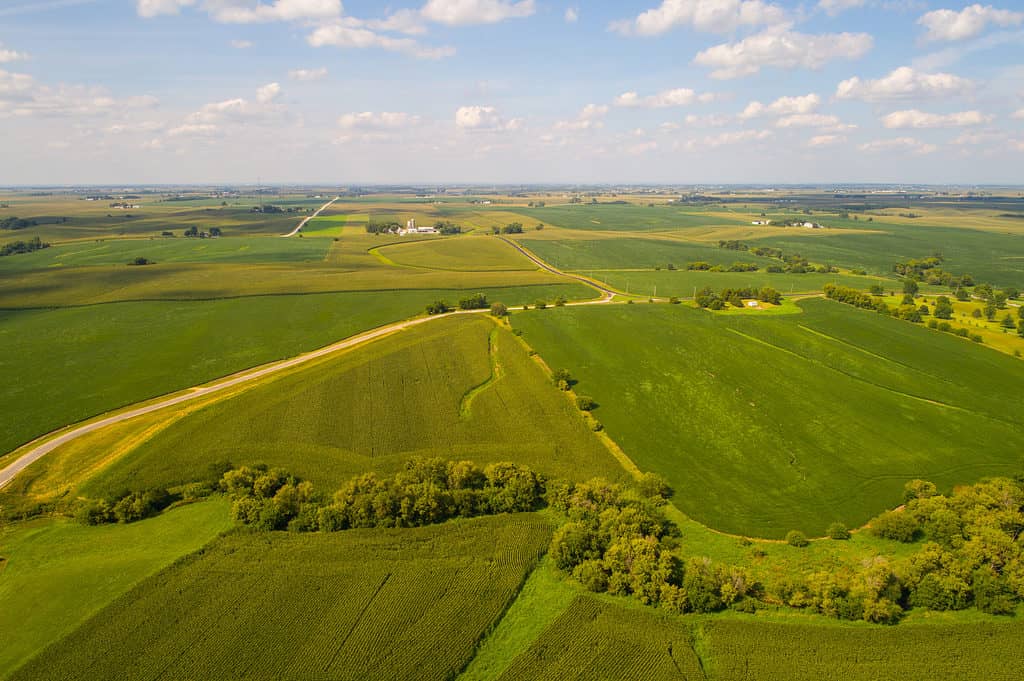
W.D. Cowls, Inc. is a family-owned farm located in western Massachusetts that has been providing the region with quality crops for generations.
©Felix Mizioznikov/Shutterstock.com
Foreign Investors – 4,980 Acres
So far, foreigners from countries like China and Canada have bought 4,980 acres in Massachusetts. This is a considerably small share compared to other states. For instance, Alabama and Colorado have 1,780,837 and 1,766,890 acres of foreign-held agricultural land, respectively.
However, several other states boast less foreign-held agricultural land than Massachusetts. A good example is Connecticut, where outsiders only own 1,861 acres.
What Foreign Land Investors in Massachusetts Should Know
Buying land in Massachusetts is straightforward, even as a foreign non-resident. Real estate in this state is sold through brokers or realtors. Hence, you’ll need a competent one on your team to boost your chances of success. Still, there’s a lot more you need to do and understand to own property here legally. Below are several things to keep in mind:
Real Estate Scams are Common
In 2022, the FBI Boston Division revealed that at least 290 people in Massachusetts fell victim to real estate scams in 2021, losing $8,944,041. Most may have been renters, but it doesn’t mean you’re safe as a potential land buyer. In fact, you risk losing even more money.
When looking to buy land in the Bay State, you’ll probably check land listings online. Watch out for these tell-tale signs of land-selling scams:
- The seller fails to provide detailed information about the property
- The seller doesn’t want you or your agent to visit the land
- The deal is too good, i.e., the land is way cheaper than other pieces within the same location.
- The seller wants to close quickly
- There are multiple listings of the same property but with different seller names
- The seller doesn’t have the title deed
- The seller doesn’t know the land’s history
- The seller wants you to pay in cash before visiting the property
- You’re unable to contact the seller
We recommend viewing the land you want to buy in person, as it’s the safest way to avoid falling victim to a fraudulent seller. This also lets you know more about the property, including the nearby amenities and infrastructure. Moreover, it’s the perfect opportunity to confirm the parcel’s features before sinking your money into it.
Location Determines Worth
A property’s value ultimately boils down to its location. Don’t purchase a piece of land before ensuring it’s within a convenient area based on your goals. For example, if you intend to build a vacation home, consider Cape Cod, which has many spots for fun and relaxing activities like boating and sunbathing. Quincy is also worth a shot, as it has a picturesque bay, nature reserves, beaches, and a vibrant city charm.
While mulling your land’s location, remember the must-have features, including amenities like hospitals, shopping, reliable water sources, and sewerage systems. You also don’t want to own a parcel in an area without good roads.
As a foreigner, figuring out the best places to buy land in Massachusetts can be challenging. Do your homework. Take advantage of online resources to research various locations. Your local real estate agent should also help since they know the state better than you do.
There Will Be Additional Costs
As you put your money into a property in Massachusetts, be ready to incur other expenses apart from paying the seller’s asking price. For instance, if you’re in another state, you’ll have to travel to the Bay State and stick around for a while to complete the land-buying process. This translates into transport and accommodation costs.
Additionally, you must set aside some money to pay your broker, who’ll provide comprehensive information and support throughout the acquisition. An experienced real estate attorney is also essential as they’ll help you navigate the legal landscape and complete the transaction successfully.
State Laws Will Affect You
Each state has its laws regarding buying and owning land. Familiarize yourself with the regulations governing property investments in Massachusetts to understand what’s expected of you and avoid legal issues. To begin with, you’ll be required to pay taxes — the specific amount will depend on your piece’s full and fair market value.
However, if you plan to venture into long-term forestry management in the Bay State, your property taxation might be tricky. Trees take years to grow and bring in profits, so it’s hard to determine the correct amount of tax to pay based on your land’s market value. Thankfully, Chapters 61, 61A, and 61B of the state’s laws can help you get fair tax treatment.
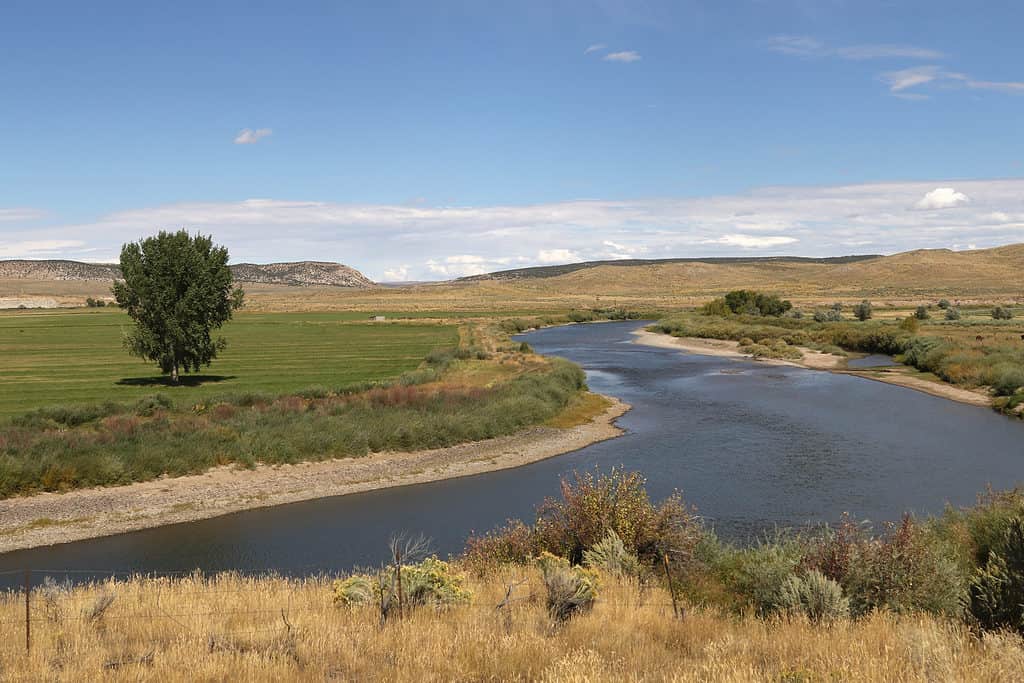
A tranquil view of the Deerfield River winding through picturesque Massachusetts farm land. A peaceful reminder of the beauty of nature.
©vagabond54/Shutterstock.com
Owning Land in Massachusetts
Farm real estate values in Massachusetts are higher than in most other regions in the US. Owning a piece of land here may require setting a relatively big budget, but it’s worth it. When the COVID-19 pandemic wrecked the economies of many states nationwide, the Bay State’s remained stubbornly strong. That’s why it still has the nation’s best schools, hospitals, and public infrastructure.
Selling land in Massachusetts is just as easy as acquiring it. Of course, many factors will come into play when determining your proceeds, such as your property’s location, usability, uniqueness, and investment permanence. If you improve your property before putting it on the market, you’ll likely fetch more money, which you can invest elsewhere, including in other real estate properties.
The photo featured at the top of this post is © iStock.com/AlbertPego
Thank you for reading! Have some feedback for us? Contact the AZ Animals editorial team.



